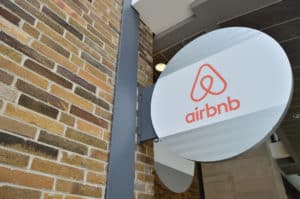The city of Boston’s attempts to track and regulate the short-term rental industry in the city appear to be ready for take-off following a settlement between it and vacation rentals giant Airbnb.
Mayor Marty Walsh today announced Thursday Airbnb had agreed to help facilitate the widespread adoption of Boston’s short-term rental registration system, and will remove listings for short-term rentals from its website that don’t comply with state or local regulations.
Walsh and many housing market experts say Airbnb rentals play a role in restricting housing supply in certain city neighborhoods, thereby forcing home prices and rents skyward. Non-owner occupants are not permitted to operate short-term rentals in their leased units under the city’s rules.
“My goal in regulating short-term rentals has always been to responsibly incorporate the growth of the home-share industry into our work to create affordable housing for all by striking a fair balance between preserving housing and allowing Bostonians to benefit from this new industry,” Walsh said in a statement.
Under the terms of the agreement, Boston will continue to require owners to register their units, and continue the city’s regulations about which units are eligible to be used as short-term rentals. On Sunday, Airbnb’s website will add a function to allow hosts to enter and display their required city-issued registration number. By Dec. 1, all listings will be required to enter this number or face removal from Airbnb’s platform Airbnb will inform users of the city’s short-term rental standards, and work with users to ensure their listings are registered with the city. People who operate Airbnb listings will have to re-register their units every year and notify abutters of the listing’s existance within 30 days of having their registration approved.
In addition, Airbnb will also share key data with Boston officials, including the listing’s unique address on Airbnb’s site, submitted registration number, unique host ID, listing information and listing ZIP code.
Finally, under the settlement agreement, city officials will have the power to notify Airbnb of any listing they think is illegal under Boston’s short-term rental ordinance. Unless the host complies with Boston’s short-term rental registration process in 30 days, Airbnb will remove the listing from its platform.
The city will divide short-term rental units into three types, with different fees for each:
- Limited Share Unit: $25 per year. Consists of a private bedroom or shared space in the owner-operator’s primary residence, in which the operator is present during the rental.
- Home Share Unit: $200 per year. Consists of a whole unit available for a short-term rental at the primary residence of the owner-operator (unit in which operator resides for at least nine months out of a 12-month period).
- Owner-Adjacent Unit: $200 per year. Consists of an owner-occupied two- or three-family building, in which the owner lists a single secondary unit as a short-term rental.
The city said no property with outstanding housing, building, fire or zoning code violations can be listed on Airbnb.




 |
| 


